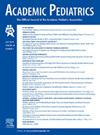以地点为基础的机会与幼儿期儿童健康检查的出席率。
IF 3
3区 医学
Q1 PEDIATRICS
引用次数: 0
摘要
背景和目的:以儿童机会指数(Child Opportunity Index [COI])衡量的较低的邻里机会与儿科发病率的增加有关,但较少用于研究纵向儿童保健。我们的目的是评估儿童机会指数与出生后儿童保健就诊率之间的关系--方法:上州 KIDS 人口出生队列包括 2008-2010 年在纽约州出生的儿童。2010年人口普查区COI(极低[VL]至极高[VH])与儿童出生时的地理编码居住地址相关联。结果是儿童从出生起就参加了世界儿童日活动:在 4,650 名儿童中,21% 的儿童(n=977)经历过 VL 或低 COI。与VH COI相比,经历过VL(调整OR [aOR] 0.68,95%CI 0.61,0.76)、低COI(aOR 0.81,95%CI 0.73,0.90)和中度COI(aOR 0.88,95%CI 0.81,0.96)的儿童参加任何WCV的几率都有所下降。在经历 VL 的儿童中,估计的、调整后的参加 WCV 的平均比例较低(0.45,p 结论:出生时COI较低与整个幼儿期参加WCV的人数减少有关。减少出生时COI较低儿童获得医疗保健的障碍可促进公平的儿童保健。本文章由计算机程序翻译,如有差异,请以英文原文为准。
Place-Based Opportunity and Well Child Visit Attendance in Early Childhood
Background
Lower neighborhood opportunity, measured by the Child Opportunity Index [COI], is associated with increased pediatric morbidity, but is less frequently used to examine longitudinal well child care. We aimed to evaluate associations between the COI and well child visit [WCV] attendance from birth – <36 months of age.
Methods
The Upstate KIDS population-based birth cohort includes children born 2008–2010 in New York state. The exposure, 2010 census tract COI (very low [VL] to very high [VH]), was linked to children’s geocoded residential address at birth. The outcome was attended WCVs from birth – <36 months of age. Parents reported WCVs and their child’s corresponding age on questionnaires every 4–6 months. These data were applied to appropriate age ranges for recommended WCVs to determine attendance. Associations were modeled longitudinally as odds of attending visits and as mean differences in proportions of WCVs by COI.
Results
Among 4650 children, 21% (n = 977) experienced VL or low COI. Children experiencing VL (adjusted OR [aOR] 0.68, 95% CI 0.61, 0.76), low (aOR 0.81, 95% CI 0.73, 0.90), and moderate COI (aOR 0.88, 95% CI 0.81, 0.96), compared to VH COI, had decreased odds of attending any WCV. The estimated, adjusted mean proportions of WCV attendance were lower among children experiencing VL (0.45, P < .01), low (0.53, P = .02), moderate (0.53, P = .05), and high (0.54, P = .03) compared to VH COI (0.56).
Conclusions
Lower COI at birth was associated with decreased WCV attendance throughout early childhood. Reducing barriers to health care access for children experiencing lower COI may advance equitable well child care.
求助全文
通过发布文献求助,成功后即可免费获取论文全文。
去求助
来源期刊

Academic Pediatrics
PEDIATRICS-
CiteScore
4.60
自引率
12.90%
发文量
300
审稿时长
60 days
期刊介绍:
Academic Pediatrics, the official journal of the Academic Pediatric Association, is a peer-reviewed publication whose purpose is to strengthen the research and educational base of academic general pediatrics. The journal provides leadership in pediatric education, research, patient care and advocacy. Content areas include pediatric education, emergency medicine, injury, abuse, behavioral pediatrics, holistic medicine, child health services and health policy,and the environment. The journal provides an active forum for the presentation of pediatric educational research in diverse settings, involving medical students, residents, fellows, and practicing professionals. The journal also emphasizes important research relating to the quality of child health care, health care policy, and the organization of child health services. It also includes systematic reviews of primary care interventions and important methodologic papers to aid research in child health and education.
 求助内容:
求助内容: 应助结果提醒方式:
应助结果提醒方式:


